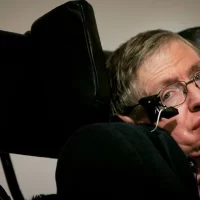Stephen Hawking Net Worth, Bio, Theories, And Lifestyle

Imagine a realm where the cosmos unfolds its mysteries like a breathtaking symphony, where the boundaries of human understanding are stretched beyond measure.
In this expanse of knowledge, few minds have shone as brilliantly as that of Stephen Hawking.
Picture a world where time dances and black holes sing, and in the heart of this cosmic ballet stands a man whose life story is as inspiring as the galaxies he explored.
So, let’s journey into the captivating universe of Stephen Hawking, a mind that defied the limitations of his body to explore the boundless frontiers of theoretical physics.
Stephen Hawking Net Worth And Biography
| Stephen Hawking Net Worth | Approximately $20 million (As of 2023) |
| Full Name | Stephen William Hawking |
| Date of Birth | January 8, 1942 |
| Age | 76 Year (Passed away on March 14, 2018) |
| Marital Status | Married |
| Wife | Jane Wilde (1965–1995) |
| Elaine Mason (1995–2006) | |
| Profession | Science writer, Physicist, Scientist, Astronomer |
| Personal Website | Hawking.org.uk |
| Children | Lucy Hawking, Timothy Hawking |
Stephen Hawking was married twice, first to Jane Wilde and later to Elaine Mason. He had three children, Lucy, Timothy, and Robert.
Stephen Hawking Intro And His Background
Stephen William Hawking was born on January 8, 1942, in Oxford, England. From an early age, it was clear that he possessed an extraordinary intellect.
However, his academic journey was not without its challenges. At the age of 21, while studying cosmology at the University of Cambridge, he was diagnosed with a rare form of motor neuron disease known as amyotrophic lateral sclerosis (ALS), which gradually left him paralyzed and confined to a wheelchair.
Doctors gave him a mere few years to live. But Hawking’s spirit was as indomitable as the galaxies he studied.
Despite his debilitating condition, he continued his research and pursued his passion for unraveling the secrets of the universe.
His determination to understand the fundamental laws governing the cosmos pushed him to communicate through a speech-generating device that he controlled with the movement of his cheek muscle.
Hawking’s work delved into areas like black holes, the Big Bang theory, and the nature of time itself.
He was particularly renowned for his discovery that black holes are not truly “black” but emit a faint radiation due to quantum effects, now known as “Hawking radiation.”
This groundbreaking insight challenged conventional understanding and paved the way for new perspectives on the behavior of these enigmatic cosmic objects.
Beyond his academic contributions, Hawking became a global icon, admired not only for his intellect but also for his wit and resilience.
He wrote several bestselling books, most notably “A Brief History of Time,” which aimed to make complex cosmological concepts accessible to the general public.
His ability to bridge the gap between theoretical physics and popular understanding earned him a place in the hearts and minds of people worldwide.
Throughout his life, Stephen Hawking shattered barriers, redefining what was possible in the face of adversity.
He showed us that the human spirit could soar even when the body was grounded, and that curiosity could overcome the constraints of physical limitations.
His legacy continues to inspire generations of scientists, thinkers, and dreamers to boldly explore the mysteries of the cosmos and push the boundaries of human understanding.
Stephen Hawking Journey | How His Career Started?
Stephen Hawking’s journey into the realm of theoretical physics began during his time at the University of Oxford, where he pursued his undergraduate degree in Natural Science.
It was here that he began to explore his fascination with the cosmos and the fundamental nature of the universe.
However, it was at the University of Cambridge where Hawking truly came into his own as a physicist. He pursued his Ph.D. in cosmology under the guidance of renowned physicist Dennis Sciama.
Sciama’s influence on Hawking’s intellectual development was pivotal, exposing him to cutting-edge ideas and nurturing his creative thinking.
Hawking’s doctoral research focused on the concept of singularities – points in space-time where the laws of physics break down, such as the heart of a black hole.
His groundbreaking thesis explored the idea that the universe had a singularity at its origin, commonly known as the Big Bang. This work laid the foundation for much of his future research and earned him his Ph.D. in 1966.
As he continued his academic pursuits, Hawking’s career faced a significant challenge when he was diagnosed with ALS at the age of 21.
Despite the prognosis of a short life expectancy, his determination and passion for physics only grew stronger.
The progression of his illness left him increasingly paralyzed, ultimately confining him to a wheelchair and making communication incredibly difficult.
In the face of these obstacles, Hawking embarked on a journey that would take him to the forefront of theoretical physics.
He continued to contribute groundbreaking ideas to the field, often collaborating with other physicists and engaging in discussions that challenged existing paradigms.
His work on black hole thermodynamics and the nature of time earned him accolades and recognition within the scientific community.
Hawking’s ability to communicate effectively became an essential part of his career.
He used a computer-based speech synthesizer, controlled by the movement of his cheek muscle, to deliver his lectures, write papers, and even give interviews.
This technology allowed him to share his insights with the world, making his ideas accessible to both scientists and the general public.
Hawking’s career wasn’t just about his research; it was also about his commitment to sharing the wonders of the universe with others.
His ability to bridge the gap between the complex world of theoretical physics and the curiosity of the masses made him a beloved figure on the global stage.
In this way, Stephen Hawking’s career trajectory was a testament to his tenacity, curiosity, and unyielding passion for understanding the universe.
Despite the challenges he faced, he rose above them, leaving an indelible mark on the field of theoretical physics and inspiring countless individuals to explore the mysteries of existence.
Recommended: Jim Cramer Net Worth | Bio, Family, Age
Turning Point Of Stephen Hawking’s Life | Success Story
The turning point that catapulted Stephen Hawking to global acclaim was undoubtedly the publication of his groundbreaking book “A Brief History of Time.”
This work, published in 1988, served as a beacon that brought complex cosmological concepts to the forefront of public consciousness.
Imagine the world being introduced to black holes, the nature of time, and the origin of the universe in a way that felt accessible, thanks to Hawking’s genius.
The impact of “A Brief History of Time” was nothing short of seismic. It soared to the top of bestseller lists, a feat almost unheard of for a book delving into the depths of theoretical physics.
Its success was not just among scientists, but among people from all walks of life who were curious about the universe’s mysteries.
The book’s engaging narrative, coupled with Hawking’s ability to translate intricate ideas into relatable analogies, made it a literary phenomenon.
This success was a turning point not only for Hawking but for science communication as a whole. The book’s popularity revealed a hunger for knowledge about the cosmos, inspiring many to explore the wonders of the universe.
It also solidified Hawking’s position as a cultural icon, someone whose name and work resonated well beyond the academic realm.
References:
- “A Brief History of Time: From the Big Bang to Black Holes” by Stephen Hawking
(https://www.hawking.org.uk/in-print/books/black-holes-the-bbc-reith-lectures?position=9)
- “History of European Space” by European Space Agency
(https://www.esa.int/About_Us/ESA_history/History_of_Europe_in_space)
The Most Popular Theories By Stephen Hawking
Let’s explore some of the most popular theories by Stephen Hawking;
1. Black Hole Radiation (Hawking Radiation)
One of Hawking’s most iconic contributions is his groundbreaking theory that black holes aren’t truly black – they emit a faint form of radiation due to quantum effects near their event horizons.
This phenomenon, known as Hawking radiation, challenged conventional notions of black holes as purely consuming entities.
Instead, it suggested that they could slowly lose mass and eventually evaporate over vast periods of time.
2. The Nature of Singularities
Building on his early research, Hawking delved into the concept of singularities – points in space-time where the laws of physics break down, such as the heart of a black hole or the origin of the universe itself.
His work helped lay the groundwork for our understanding of the Big Bang, proposing that the universe had a singular beginning.
3. The No-Hair Theorem
This intriguing idea revolves around the concept that the unique characteristics of a black hole are determined solely by its mass, charge, and angular momentum – known as its “hair.”
Hawking, along with other physicists, worked on formulating this theorem, which suggests that all other information about matter that falls into a black hole might be lost to the singularity.
4. Cosmic Inflation Theory
Although not exclusively Hawking’s theory, his collaboration with physicist James Hartle on the “no-boundary proposal” contributed to the development of cosmic inflation theory.
This theory posits that the universe underwent a rapid exponential expansion in its early moments, providing an elegant explanation for the observed uniformity of the cosmos on a large scale.
5. Top-Down Cosmology
Hawking explored the idea of a “top-down” approach to cosmology, suggesting that the universe’s initial conditions might have been set by a specific set of laws that could determine its entire evolution.
This theory presented an alternative to the traditional “bottom-up” approach, where the universe’s structure emerges from random fluctuations.
These theories showcase the depth of Stephen Hawking’s intellectual contributions and their far-reaching implications for our understanding of the cosmos.
Each theory reflects his ability to push the boundaries of theoretical physics and challenge conventional wisdom, leaving an enduring legacy that continues to inspire scientific exploration.
Stephen Hawking’s Health Issues
Stephen Hawking, despite his towering intellect and monumental contributions to science, faced profound health challenges that added a layer of complexity to his life.
Diagnosed with amyotrophic lateral sclerosis (ALS) at the young age of 21, he was given a grim prognosis of just a few years to live.
ALS, often referred to as Lou Gehrig’s disease, is a progressive neurodegenerative disorder that affects nerve cells controlling muscle movement.
As the years passed, the impact of ALS became more pronounced in Hawking’s life.
The disease gradually robbed him of his ability to control his muscles, leading to paralysis and severely limiting his physical movements.
Eventually, he became confined to a wheelchair, which also became a canvas for his distinctive communication system.
His remarkable resilience, however, was as awe-inspiring as his scientific breakthroughs. He adopted a communication system that relied on small facial muscle movements to control a speech-generating device.
This technology allowed him to express his thoughts and ideas, engage in lectures and discussions, and even interact humorously with the world – all through his iconic synthesized voice.
Hawking’s health challenges were a testament to his tenacity. Despite the physical constraints, he continued to explore the mysteries of the cosmos, travel, and engage with his peers in the scientific community.
His story became a symbol of defying the odds, as he far outlived the initial prognosis to become one of the most recognized and respected figures in science.
While his journey with ALS was undoubtedly a tremendous struggle, Stephen Hawking’s legacy is a reminder that the human spirit can transcend even the most daunting obstacles.
His brilliance, coupled with his unyielding determination, showcased the power of the mind to conquer the limitations of the body and reach for the stars – both metaphorically and literally.
Recommended: Blake Masters Net Worth | Bio, Family, Age
Stephen Hawking Net Worth
The legacy of Stephen Hawking, the brilliant mind behind revolutionary ideas in theoretical physics, is celebrated worldwide.
Surprisingly, Stephen Hawking estimated net worth was around $20 Million, according to sources like celebritynetworth and dailymail.
This figure might come as a surprise given his iconic status, but it reflects his emphasis on intellectual pursuits rather than financial gains.
Hawking’s devotion to unraveling the mysteries of the cosmos exemplifies how a passion for discovery can often transcend the pursuit of material wealth.
Stephen Hawking Twitter Account
with all control of my body gone, I use a program through a cheek muscle attached to a sensor to choose my words. pic.twitter.com/TRZVWhKKEA
— Stephen Hawking (@TheScientist_SH) January 8, 2016
Stephen Hawking Lifestyle
Stephen Hawking’s lifestyle was a unique blend of extraordinary intellectual pursuits, resilience, and a touch of everyday charm.
Despite his exceptional contributions to the world of theoretical physics, he maintained a down-to-earth approach that endeared him to people from all walks of life.
Living with amyotrophic lateral sclerosis (ALS) meant that Hawking faced significant physical challenges, yet he refused to let his condition define him.
He embraced technology to communicate, using a speech-generating device that allowed him to engage in conversations, lectures, and even humorous exchanges.
His distinct robotic voice became synonymous with his presence, and he often joked about it, showcasing his sharp wit.
Hawking’s curiosity extended beyond the cosmos; he had a zest for life that touched on more relatable aspects.
He was known for his love of classical music, and he enjoyed traveling and exploring new places whenever possible.
He was also a fan of sports, particularly rugby and Formula One racing, and his enthusiasm for these hobbies added a relatable dimension to his larger-than-life persona.
Despite his fame, Hawking remained grounded, valuing interactions with fellow scientists, students, and the general public.
He often engaged in public lectures and discussions, making complex scientific concepts accessible to non-experts.
His book “A Brief History of Time” further showcased his commitment to sharing the wonders of the universe with everyone, bridging the gap between the academic and popular worlds.
In essence, Stephen Hawking’s lifestyle was a testament to the power of human determination, intellect, and humor.
His ability to blend his profound understanding of the cosmos with everyday passions and a touch of playfulness made him not just a scientific luminary, but also a relatable figure who continues to inspire people to dream big and explore the mysteries of life.
Last Words
Stephen Hawking’s extraordinary battle with ALS was nothing short of inspirational. His journey showcased the remarkable capacity of the human spirit to overcome the most daunting challenges.
In the face of a devastating diagnosis, Hawking’s unwavering determination and his ingenious use of technology allowed him to continue exploring the universe’s mysteries, sharing his insights, and even finding joy in everyday pleasures.
Hawking’s story serves as a reminder that our potential for growth and discovery can transcend physical limitations.
His legacy extends far beyond the scientific realm; it’s a testament to the strength of the human mind and the resilience of the human heart.
If you’re intrigued by stories of remarkable individuals like Stephen Hawking and the profound impact they’ve had on the world, consider joining us at Globlar.com.
Our platform celebrates the triumph of the human spirit, shares inspiring narratives, and connects curious minds who appreciate the power of resilience and knowledge.
Join us as we explore the stories that remind us of the boundless potential within each of us.














